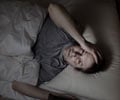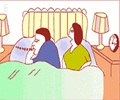The
Epworth Sleepiness Scale is a set of questionnaires that helps in diagnosing sleep disorders. It measures ‘daytime sleepiness’ of a person.
The Epworth Sleepiness Scale was developed by Dr. Murray Johns of the Epworth Hospital in Melbourne, Australia. Sleep disorders are usually temporary disorders. Some individuals do suffer from long term problems and this can creates health problems. Both the quantity and quality of sleep are important and this scale will help one to assess these parameters.
What is Sleep Disorder?
Sleep is an active state of unconsciousness produced by the body. The brain is in a relative state of rest and is reactive primarily to internal stimuli. Sleep is a part of daily routine and one-third of the time is spent on sleeping (
1✔).
Sleep disorders (or sleep-wake disorders) are a group of conditions that affect the ability to get restful sleep. In other words, sleep disorder can denote lack of sleep or daytime sleepiness. Chronic lack of sleep or poor quality of sleep increases the risk of various health conditions like heart diseases, and obesity.
Lack of sleep can affect the productivity of a person at work and sleep. Losing sleep for even 1 or 2 hours per night for weeks or months can reduce the ability to work efficiently (
2✔).
Lack of sleep leads to microsleep. Microsleep refers to a short period of sleep when awake. It can affect the daily functioning. Microsleep can occur at anytime without us knowing it, it can be dangerous.
Sleep Disorder Categories vs Types
Sleep disorder categories are the broad classification of sleep disorders, while sleep disorder types are specific condition that falls under these categories.
Categories of Sleep DisorderThe categories of sleep disorders changes from time to time. The International Classification of Sleep Disorders (ICSD) recently categorized sleep disorders based on symptoms, and how they affect a person and body.
According to ICSD-3R sleep disorders are categorized as
- Insomnia
- Sleep-related breathing disorders
- Central disorders of hypersomnolence (CDH)
- Circadian rhythm sleep-wake disorders
- Parasomnias (sleepwalking, talking, acting violently)
- Sleep-related movement disorders
- Other sleep disorders
Types of Sleep Disorders
There are more than 80 types of sleep disorders. The most common types are:
Chronic Insomnia: This is a sleep disorder that is characterized by difficulty in sleeping for three nights a week for 3 or more months.
Obstructive Sleep Apnea: It is the most common sleep related sleep disorder. It is characterized by snoring and absence of breathing for few seconds in sleep. The throat muscles gets relaxed causing the airway narrow which obstructs breathing (
3✔).
Restless Leg Syndrome: It is a chronic neurological disorder that causes an uncontrollable urge to move legs at night or rest. It is also called as Willis-Ekbom Disease (
4✔).
Narcolepsy: Narcolepsy is a chronic neurological condition that affects the brain’s ability to regulate the sleep-wake cycle. It may cause excessive daytime sleepiness and sleep attacks (
5✔).
Shift Work Sleep Disorder(SWSD) : It is circadian rhythm sleep disorder. It most commonly affects people who work outside the regular 9 to 5 jobs like night shifts, rotational shifts. It causes problems with falling asleep, staying asleep and sleeping at unwanted times (
6✔).
Delayed Sleep Phase Syndrome (DSPS): It is a disorder in which a person’s sleep is delayed by two hours or more beyond what is considered an acceptable or conventional bedtime. The delayed sleep then causes difficulty in being able to wake up at the desired time (
7✔).
REM Sleep Behavior Disorder: It is a type of parasomnia involving dream enactment behavior associated with paralysis during rapid eye movement (REM) sleep. These symptoms may bring serious harm to the individual themselves and their sleeping partners (
8✔).
Causes of Sleep Disorder
Causes for sleep disorders are specific for each types. Some of the commonly known causes of sleep disorders are (
9✔)
- Medical condition like heart disease, asthma, pain or a nerve condition
- Mental health conditions like depression or anxiety disorder
- Genetic factors (a mutation)
- A side effect of a medication
- Working the night shift
- Substance use before bedtime like caffeine or alcohol
- Low levels of certain chemicals or minerals in the brain
- Unknown cause
What are the Symptoms of Sleep Disorder?
Symptoms of sleep disorders are specific to certain types, the possible symptoms during the night maybe
- Difficulty falling asleep (takes more than 30 minutes to sleep regularly)
- Troubled sleeping (frequent waking up during sleeping)
- Snoring, choking or gasping for air during sleep
- Irresistible urge to move while resting
- Feeling paralyzed and unable to move when awakening from sleep
Due to disturbed sleep some may experience certain symptoms during daytime. They are(
10✔)
- Daytime sleepiness
- Difficulty in concentration or doing any work
- Mood swings like irritability or controlling emotions
- Poor performance at work or school
- Frequent falls or accidents
Evaluating and Diagnosing Sleep Disorder
To evaluate sleep disorders, medical professionals consider medical history, sleep history and physical exam. There are many questionnaires and sleep studies to evaluate sleep disorders and helps to rule out differential diagnoses. Most common questionnaires are:
Epworth Sleepiness Scale (ESS) is an eight question sel evaluation questionnaire that test the presence and severity of sleep disorder.
Fatigue Severity Scale (FSS) is a nine-item questionnaire that helps to distinguish fatigue from sleep disorder and finds the severity of fatigue.
Insomnia Severity Scale (ISS) is used to diagnose insomnia and its severity. It is most widely accepted assessment. It is used along with sleep diary.
Sleep Diary is a personal paper record of sleep and wakefulness over weeks or months. Patients record their sleep in a detailed manner like when they slept, how much time it took to fall asleep and any awakening during sleep etc, must be recorded (
11✔).
Sleep studies also called
polysomnography (PSG) is a test that measures and records the body functioning during sleep. The test is done during normal sleeping hours. The study can be done at hospital, sleep study clinic or at home.
The study done at home is called
home sleep apnea testing (HSAT) is used to study only sleep apnea and it can’t be used to diagnose any other sleep disorders (
12✔).
Diagnostic Tests for Sleep Disorder
Laboratory tests that helps to diagnose sleep disorder involves
Arterial blood gases (ABG), thyroid function tests, drug and alcohol toxicity screening, iron studies and ferritin level tests. These blood tests helps in diagnosing the conditions.
Other diagnostic tests used to diagnose sleep disorders are actigraphy and multiple sleep latency testing
Actigraphy:Actigraphy is the measurement of body movements during activity and rest. It is measured using actigraph, a wearable device that records data about the movements during active times and sleep. It is similar to watch that can be worn on wrist or ankle (
13✔).
Multiple Sleep Latency Test (MSLT):Multiple sleep latency test record how long it takes to fall asleep (sleep latency) and what sleep stage occurs during sleep and naps. It is used to diagnose narcolepsy and hypersomnias (
14✔).
How Much Sleep is Needed?
Good quality of 7 to 9 hours is recommended. The hours of sleep needed change for different ages. Sleeping 9 hours may not be harmful in young adults as it can help sleep deprived persons regain their normal state.
| Age | Recommended hours of sleep per day |
| 4 months to 1 year old | 12 - 16 hours |
| 1 to 2 years old | 11 - 14 hours |
| 3 to 5 years | 10 - 13 hours |
| 6 to 12 years | 9 - 12 hours |
| 13 to 18 years | 8 - 10 hours |
| Adults | 7 or more at night |
How Sleep Disorders are Treated?
Based on type of sleep disorders treatment plan changes. The treatment which are used to treat sleep disorders are
- Cognitive behavioural therapy - to know about sleep, how to fall asleep, understand why you can not get enough sleep
- Taking medications like sleeping pills or melatonin supplements
- Use of continuous positive airway pressure (CPAP) machine or implant neurostimulator to control sleep apnea
- Light therapy
- Change medication or alter medicine dosages that cause excessive sleepiness
How to Get Better Sleep?
Sleep for adequate time can be a better option to treat sleep disorders which can be cured with lifestyle modification. These are few lifestyle modifications that can help us to sleep better and improve quality of sleep without any disturbances.
- Manage stress levels and find a way to destress yourself. Destress by reading a book, listening to soft music or meditation.
- Create a comfortable sleep environment. Make your bedroom cool, quiet and dark; if noises disturb sleep then use white noises or earplugs to avoid waking up.
- Maintain regular bedtime, sleep and wake up at same time daily.
- Avoid coffee, fizzy drinks and alcohol close to bedtime as it can make it difficult to fall asleep.
- Exercise regularly during the daytime and avoid exercising closer to bedtime.
- Avoid napping in the afternoon and it helps to get longer sleep at night.
- Try to eat meals at the same time everyday and avoid late night dinners.
- Limit exposure to blue light before bedtime.
- Limit fluid intake near bedtime as it helps to get uninterrupted sleeping without the need to use bathroom (16✔).
Advertisement
FAQ’s
1. Can sleep disorder be cured?
Yes, sleep disorders can be cured with available treatment options.
2. Are sleep disorders harmful?
No, but chronic lack of sleep or loss of sleeping hours is associated with various health problems like hypertension, heart diseases, depression, etc,(17✔).
3. What is the 10-3-2-1-0 rule for sleep?
The 10-3-2-1-0 sleep rule (18✔):
- 10 hours before bed = no more caffeine
- 3 hours before bed = no more food or drink
- 2 hours before bed = no more work
- 1 hour before bed = no more screen time
- 0 = number of times you hit the snooze button
4. What are the foods that help us to sleep?
Certain nutrients and hormones help to promote sleep. Melatonin helps to feel sleepy and promotes sleep. Melatonin (found in dairy and cherries) makes you sleepy, potassium (found in bananas) and magnesium (also found in bananas and almonds) help promote muscle relaxation and help to get good sleep (19✔).
5. Does drinking a glass of milk before bed help you sleep?
Tryptophan and melatonin help us to get a good night sleep. Milk and other dairy products are good sources of tryptophan. Tryptophan promotes melatonin and serotonin production and it also help us to get good sleep (20✔).
6. What is sleep anxiety?
Sleep anxiety is feeling stressed or fear about going to sleep. Anxiety is the most common mental disorder. Most people with anxiety experience sleep disruption (21✔).
7. What is sleep divorce?
The decision to sleep in separate rooms is called sleep divorce. This can help you to get good quality of sleep. According to American Academy of Sleep Medicine (AASM), more than a third of American couples have opted for a sleep divorce (22✔).
8. Is a 1 hour sleep good?
1 hour napping is good but try to keep napping for 10 to 20 minutes. Some individuals can tolerate longer napping without any disruption in night sleep. Older adults can not handle napping as it can disturb their nighttime sleep (23✔).
9. What is the most serious sleep disorder?
The most serious sleep disorder is sleep apnea. More than 20 million Americans have sleep apnea. The frequent choking and breathing interruptions—at least 5 times an hour—affect sleep quality and oxygen levels. Without treatment, it's tied to high blood pressure, heart disease and stroke (24✔).











